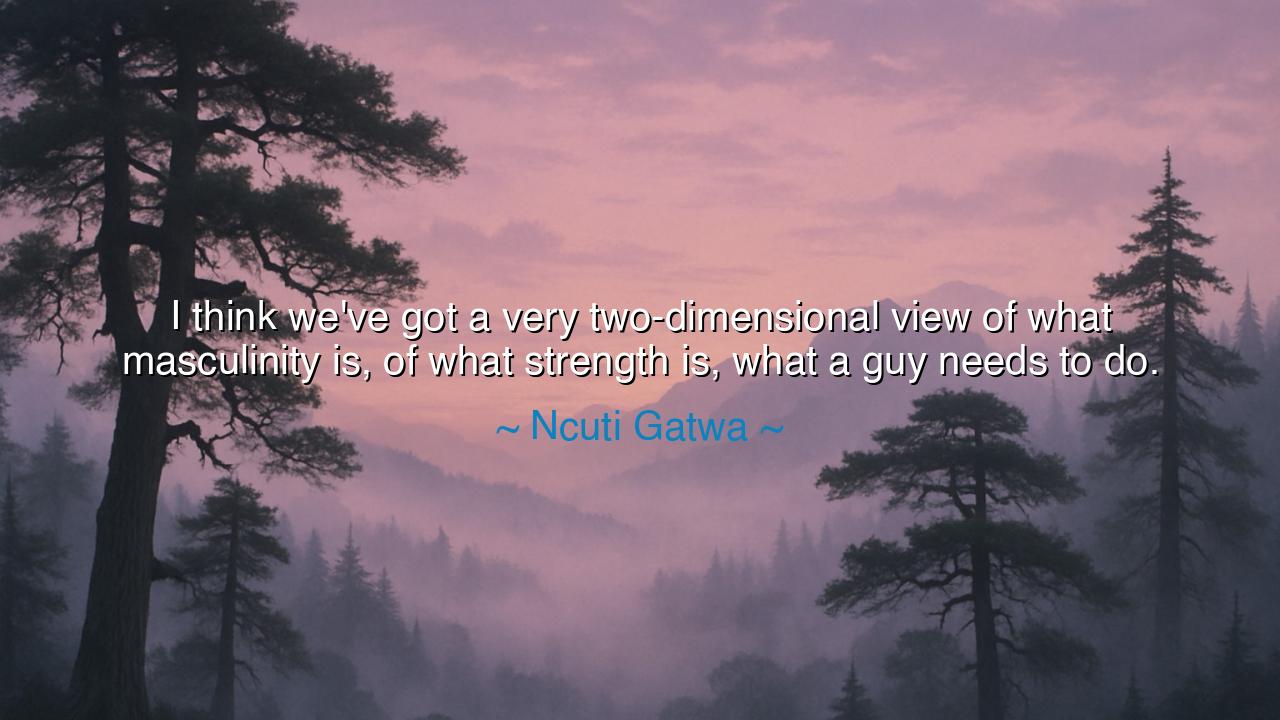
I think we've got a very two-dimensional view of what
I think we've got a very two-dimensional view of what masculinity is, of what strength is, what a guy needs to do.






The words of Ncuti Gatwa fall with the weight of revelation: “I think we’ve got a very two-dimensional view of what masculinity is, of what strength is, what a guy needs to do.” In these words, the actor unmasks a narrow vision of manhood that has been passed down through generations, a vision that chains men to hardness, silence, and pride, while denying them the fullness of their humanity. He speaks not only of men, but of a society that has flattened the rich tapestry of the soul into a single thread, and in doing so, has left both men and women impoverished.
For what is masculinity, if it is seen only in muscle, in conquest, in the stern silence of one who hides his wounds? This is the “two-dimensional” vision Gatwa warns of—a picture that strips away gentleness, vulnerability, tenderness, and truth. It is a false idol, carved by fear and upheld by tradition, that demands men cage their tears, suppress their compassion, and measure themselves only by dominance. Yet true strength cannot live in such narrowness, for it is not the absence of feeling but the courage to embrace the whole of one’s being.
History itself testifies to this truth. Consider Marcus Aurelius, the Roman emperor and Stoic philosopher. He ruled one of the mightiest empires in the world, commanding armies and wielding power. Yet in his Meditations he wept upon the page, confessing his doubts, his struggles, his longing to be virtuous in a corrupt world. His greatness was not in hiding his weakness, but in acknowledging it, and striving toward wisdom and humility. His life proves Gatwa’s words: that masculinity and strength cannot be confined to mere power, but must include honesty of the heart.
Or remember Mahatma Gandhi, frail in body, soft in voice, gentle in appearance. By the narrow vision of strength, he was weak. Yet by his spirit, by his courage to resist without violence, he became a giant, toppling an empire. In him we see that the world’s true heroes are not always clad in iron or fire—they are often clothed in patience, in resilience, in love. Gatwa’s critique is confirmed by such examples: our measure of men has been too thin, too small, too shallow.
The meaning of Gatwa’s words is therefore both liberating and challenging. It tells us that strength is not only to lift burdens, but to speak truth even when the voice trembles. It is not only to fight enemies, but to comfort friends. It is not only to endure pain in silence, but to share it, so that others may know they are not alone. To broaden our vision of masculinity is to restore to men the freedom to be fully human—to laugh and cry, to protect and to nurture, to lead and to follow, to be both fierce and tender.
The lesson is clear: do not bind yourself, or others, to the narrow idol of two-dimensional manhood. For the man who lives only by hardness will break, and the man who hides his wounds will rot beneath the mask. Instead, seek a deeper, fuller vision of strength. Teach boys not only to be brave in battle, but to be brave in kindness. Teach men not only to carry burdens, but to share them. Teach the world that masculinity is not diminished by gentleness, but completed by it.
Practical action lies in breaking the silence. Begin by speaking truth about your own feelings; show that vulnerability is not weakness, but courage. Support others who step outside the narrow image of manhood, and honor the ways they show strength beyond the expected. Challenge the old idols—whether in family, school, or society—that say men must be only conquerors. Instead, lift up those who show that the heart, the mind, and the spirit are as mighty as the arm.
So let Gatwa’s words endure as counsel for generations: that masculinity is not two-dimensional, and strength is not one shape. The man who is fully alive—who dares to feel, to love, to endure, and to rise again—is the truest of men. And when nations learn this truth, they will no longer chain half of humanity in silence, but will free them to bring their whole selves to the world.






AAdministratorAdministrator
Welcome, honored guests. Please leave a comment, we will respond soon